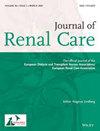Exploring Haemodialysis Nurses' Perceptions on Kidney Replacement Therapy Modality Education: A Framework Analysis
Abstract
Background
Many people with kidney failure start and remain on in-centre haemodialysis treatment despite evidence of improved outcomes with home dialysis. To make an informed modality decision patients must receive frequent, high-quality modality education. This education is inconsistent in the in-centre haemodialysis setting, where patients spend the most time with nurses while receiving haemodialysis treatments.
Objectives
The aim of this study was to examine in-centre haemodialysis nurses' perceptions around modality education for patients receiving in-centre haemodialysis using the COM-B model of behaviour change.
Design
We used framework analysis as a research method, applying the COM-B model as a theoretical framework to understand nurses' perceptions of modality education.
Participants
We interviewed 13 in-centre haemodialysis nurses in a single province in Canada.
Approach
We completed semi-structured interviews via Zoom, which ranged from 30 to 60 min.
Findings
Participants reported knowledge deficits, lack of experience or exposure to other dialysis modalities, and lack of resources to support modality education practices. In-centre haemodialysis nurses reported some factors that enhanced modality education, including strong nurse–patient therapeutic relationships and previous experience in other dialysis modalities.
Conclusions
Nurses could have a role in modality education but had different views on what this role should be. Nurses faced barriers in modality education such as knowledge deficits, a lack of experience with home modalities, and limited patient teaching resources. Factors that favoured modality education were strong nurse–patient relationships and previous experience with other modalities.

 求助内容:
求助内容: 应助结果提醒方式:
应助结果提醒方式:


